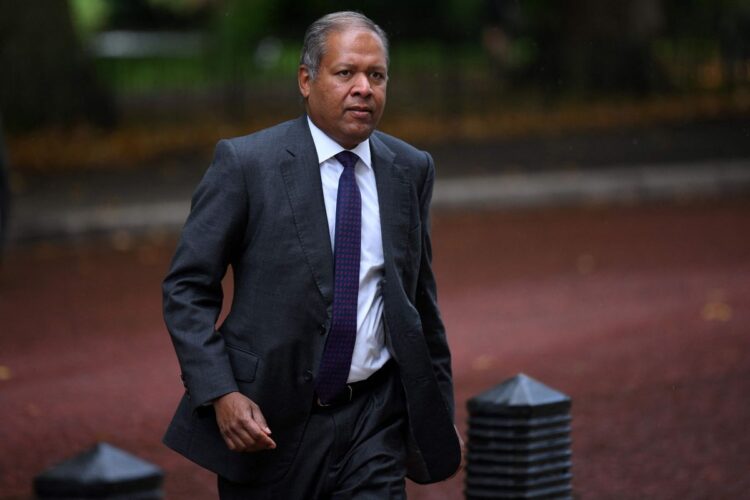By Gabriel Princewill-
The CEO of Barclays bank, C. S. Venkatakrishnan,(pictured) must take decisive action to rebuild trust and implement a robust framework for accountability, after one of its customers was overdrawn by over £1.5m without prompt and full explanation.
The disgruntled lady was kept in the dark about her bizarre situation for weeks, without an adequate response on a matter that important.
Compounding the embarrassing failing was the bank’s ineptitude in explaining to the media how such a shambolic affair could occur in its instituion.
How a supposedly prominent bank could behave so ineptly about such large figure is alarmingly shocking, and calls for an overhaul in its procedures.
The need to acknowledge the existing lack of accountability and create an environment of transparency, while encouraging employees to take ownership of their actions is pressing in light of the spate of serious complaints about its attendance to safety mechanisms for its customers.
Complaints from customers of Barclays Bank this year alone highlight the urgency for the bank to demonstrate a comprehensive ethical framework encompassing the bank’s values, code of conduct, and guidelines for decision-making, ensuring that all employees understand their responsibilities and the consequences of non-compliance.
Customers of Barclays bank spoken to by this publication say Venkatakrishnan needs to prioritize strengthening internal controls and compliance mechanisms within the bank, involving conducting regular audits, implementing robust risk management systems, and establishing an effective whistleblower protection program.
Marcus Kilory, a customer of the bank told The Eye Of Media.Com: ”Through the reinforcement of useful structures, the bank can identify potential issues and prevent misconduct, fostering a culture of accountability in the process.
Accountability can be bolstered by setting clear Key Performance Indicators (KPIs) for employees at all levels, particularly in relation to adequate responses to complaints. These KPIs should align with the bank’s strategic goals and emphasize ethical behaviour and responsible decision-making. Regular assessment and feedback on performance against these indicators will promote accountability and allow for timely course corrections.
Transparency
Venkatakrishnan also needs to prioritize transparency in reporting to improve accountability in his gradually disreputable which involves ensuring accurate and timely financial reporting, adhering to regulatory requirements, and providing stakeholders with comprehensive and understandable information. Transparent reporting builds trust with shareholders, regulators, and the public, leading to enhanced accountability.
Karen Anderson, a customer of Barclays told The Eye Of Media.Com: ”Venkatakrishnan must encourage a culture that supports whistleblowing and protects those who come forward. The bank should develop channels for confidential reporting and guarantee non-retaliation against whistleblowers, fostering a culture where misconduct is exposed and addressed promptly”.
Venkatakrishnan, who earns £5.2m year, was in 2022 diagnosed with non-Hodgkin lymphoma, a form of cancer that affects the lymph nodes, but which is curable
Implementing Effective Governance and Oversight
Strong governance and oversight structures are vital for ensuring accountability. Venkatakrishnan should prioritize establishing independent board oversight, comprising directors with relevant expertise and a commitment to upholding accountability. Regular board evaluations, clear role delineation, and effective risk management committees will bolster accountability throughout the bank.
The first critical step for CEO C. S. Venkatakrishnan is acknowledging the existing lack of accountability within Barclays Bank. By openly recognizing the issue, he can create an environment of transparency and encourage employees to take ownership of their actions. Open communication and dialogue are essential in fostering an accountable culture.
The need for Barclays Bank to establish a coherent framework encompassing the bank’s values, code of conduct, and guidelines for decision-making is pressing. The bank definitiely needs to improve
It is absolutely imperative that Venkatakrishnan prioritizes the strengthening of internal controls and compliance mechanisms within the bank. This involves conducting regular audits, implementing robust risk management systems, and establishing an effective whistleblower protection program. By reinforcing these structures, the bank can identify potential issues and prevent misconduct, thus fostering a culture of accountability.
Establishing Key Performance Indicators (KPIs)
Accountability can be bolstered by setting clear Key Performance Indicators (KPIs) for employees at all levels, aligning those with the bank’s strategic goals and emphasize ethical behavior and responsible decision-making. Regular assessment and feedback on performance against these indicators will promote accountability and allow for timely course corrections.
Enhancing Transparency in Reporting
Venkatakrishnan should prioritize transparency in reporting to improve accountability. This involves ensuring accurate and timely financial reporting, adhering to regulatory requirements, and providing stakeholders with comprehensive and understandable information. Transparent reporting builds trust with shareholders, regulators, and the public, leading to enhanced accountability.
Encouraging Whistleblowing and Protecting Whistleblowers
Creating a safe environment for employees to report wrongdoing is crucial in establishing accountability. Venkatakrishnan must encourage a culture that supports whistleblowing and protects those who come forward. The bank should develop channels for confidential reporting and guarantee non-retaliation against whistleblowers, fostering a culture where misconduct is exposed and addressed promptly.
Implementing Effective Governance and Oversight:
Strong governance and oversight structures are vital for ensuring accountability. Venkatakrishnan should prioritize establishing independent board oversight, comprising directors with relevant expertise and a commitment to upholding accountability. Regular board evaluations, clear role delineation, and effective risk management committees will bolster accountability throughout the bank
Ensuring Transformation:
In order to ensure long-term transformation, Venkatakrishnan needs to embed a culture of accountability throughout the organization, through consistent reinforcement of ethical behaviour, regular training programs, and ongoing monitoring of key metrics. Embracing technology and data analytics can also provide insights into areas that require improvement and streamline processes, further enhancing accountability.




